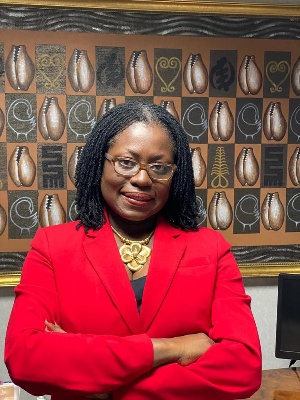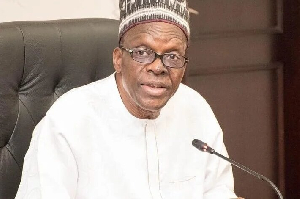The Chairperson, Justice Professor Akua Kuenyehia, Members of the Board, the Chief Executive Officer and the Management Team, Standard Chartered Bank Ghana, The President and Vice Chancellor, Ashesi University College, The Executive Director, Ghana Climate Innovation Centre, Invited Guests, Distinguished Ladies and Gentlemen
I am honoured to have been invited to deliver the keynote address for the launch of Standard Chartered Bank (Ghana) Limited’s Women in Technology (WIT) Business Incubator programme under the theme, “Technology, Gender and Development – Expanding the Role of Technology in Women-Owned Businesses for National Development”.
I extend to you warm felicitations from Governor Ernest Addison, and Management of the Bank of Ghana on this very important occasion.
Standard Chartered Bank has operated in Ghana for over a century, making significant contributions to Ghana’s banking landscape and capital market, and supporting private sector-led economic development. Standard Chartered Bank continues to show leadership, as it empowers its key stakeholders to play their respective roles in nation building.
The WIT Business Incubator programme in collaboration with the Ghana Climate Innovation Centre of Ashesi University, is one of many ways in which Standard Chartered Bank is living up to its pledge of being “Here for Good.” Here for good, not only for over a century and counting, but also here to promote good for its key stakeholders and support Ghana’s socio-economic development, more generally, using its market power.
I am very happy to note that the WIT incubator programme has a special focus on enabling women-led/owned businesses to leverage technology and business incubation support. This is part of Standard Chartered Bank’s efforts towards promoting more diversity through innovation and providing more opportunities for women to develop entrepreneurial excellence, while more generally, influencing a national dialogue to help promote sustainable socio-economic development.
This programme is being launched at a time when women are lagging behind their male counterparts in a number of important areas including (i) Science, Technology, Engineering, and Math (STEM) education; (ii) the use of technological solutions such as digital applications to harness business opportunities; (iii) access to finance; and (iv) scaling up their businesses.
While Ghana’s private sector is dominated by women entrepreneurs, second only to Uganda according to the 2019 MasterCard Index of Women Entrepreneurs, research shows that women-led businesses tend to remain smaller and less profitable compared to those led or owned by men. According to Mastercard, women also account for less than 45% of entrepreneurs in the five most productive sectors (i.e. financial services, ICT, manufacturing, transportation, oil and gas).
As I alluded to a little while ago, in spite of their significant contributions to economic development, women lag behind male counterparts in accessing finance.
Globally, there is a nine percent gap in access to finance for women, according to the World Bank’s 2017 Global Findex Survey. According to the same report, in Ghana, women lag behind their male counterparts by eight percent in access to finance.
Without access to critical funding, women-owned businesses suffer and struggle to create the scale that is needed to connect to global value chains and become economically significant. The African Development Bank reported a $1.5 trillion financing gap for women-led SMEs globally, as of 2019, with about 70% of women in Africa financially excluded.
What is more, about 56 percent of Ghana’s population is made up of the youth, of which females represent 50%, according to data from IndexImundi. In addition to the gender disparities that women face, the fact that many of them also fall within the youth bracket complicates life for them even more given the challenges the youth face in securing jobs, capital and other support for starting and growing their own businesses.
The distributional effects of the pandemic on women and the youth have also been enormous as many of them have lost their jobs and businesses, pushing them out of both formal and informal employment and business and further widening the gender gap in access to finance. The benefits of retooling such entrepreneurs to start new businesses or gain new employment leading women-led businesses will translate into more growth for the Ghanaian economy as examples elsewhere have shown.
Technology will play a key role towards realising this goal. The ongoing pandemic has shown how critical technology has become for business survival. The resilience of several businesses, especially those owned or led by women, continues to be tested in these trying times. Businesses have no option than to embrace technology, or become less competitive or even extinct. With the opportunities provided by the recent growth in many online business tools and payment platforms, women led/owned businesses have no excuse.
The WIT Business Incubator programme being launched today by the Standard Chartered Bank Ghana in collaboration with Ashesi University is therefore a very important move to help women develop, test, and grow viable businesses with the help of technology.
I know Ruka Sanusi who runs Ashesi’s Ghana Climate Innovation Centre personally as someone who is very passionate about helping SMEs with business management and corporate governance support, so I have no doubt that beneficiaries of the programme will enjoy that support. This programme will help to de-risk women led/owned businesses and make them more attractive to banks, venture capital funds, and other financial institutions to help make them major players in the private sector.
By this initiative, Standard Chartered Bank Ghana is helping to bridge the gap in financing for women-owned/led businesses and therefore helping to promote more inclusive economic growth and impact.
The policy and regulatory environment in Ghana is supportive of such an initiative.
The Government of Ghana’s National Financial Inclusion and Development Strategy seeks to close Ghana’s gender gap of 8% by 2023. As a regulator, the Bank of Ghana has over the years introduced regulation to support an ecosystem that supports banks to partner with electronic money issuers (MMOs), fintechs and others to promote the roll-out of innovative and convenient payment and digital financial services and products to support businesses, particularly MSMEs.
The Bank of Ghana has also developed sex-disaggregated measurement tools and indicators as well as data collection methodologies to track progress in reducing the gender gap in access to finance in line with its commitments under the Alliance for Financial Inclusion’s Denarau Action Plan.
We at the Bank of Ghana are pleased to note that Standard Chartered Bank through this initiative has operationalized Ghana’s Sustainable Banking Principles (SBPs) launched in November 2020, of which Principles 4 and 5 address the need to promote gender equality and financial inclusion, in alignment with the Sustainable Development Goals. I call on other banks to explore such innovative programmes to help harness productivity and inclusive economic growth, in keeping with their commitments under the Sustainable Banking Principles.
Madam Chair, Board members, management and staff of Standard Chartered Bank Ghana, I congratulate you again on this outstanding initiative, and for showing leadership. I congratulate Ashesi University for partnering with Standard Chartered Bank Ghana. It is strategic partnerships of this nature that are needed to help rethink and find lasting and innovative solutions to development challenges in Ghana.
On this note, I hereby declare the Standard Chartered Bank Ashesi University WIT Business Incubator programme duly launched, and I wish it every success.
Thank you all for your attention.
Click to view details



Business News of Friday, 4 December 2020
Source: bog.gov.gh

















